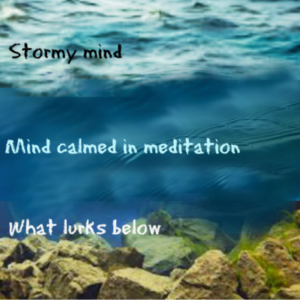Resilience…really, I wish that everyone who has learnt meditation and mindfulness from me – or from anyone else – would also take the Resilience program that I teach. And I wish that people who have learnt resilience with me would follow up by learning meditation with me, too. They are two different, but very complementary techniques – together, they give you a stronger, more flexible mind that can be both forbearing and insightful, calm and purposeful, peacefully quiet but also fully engaged and self-validating while active.
 Resilience means different things to different people, and so does meditation, and so does mindfulness. For now, let’s take it that meditation is emptying your mind, not engaging with thoughts; mindfulness is awareness without judging; and resilience is the ability to bounce back from slights and ego injuries, and to handle difficult situations with a realistic, problem-solving attitude rather than with emotional reaction, or criticism, or despondency.
Resilience means different things to different people, and so does meditation, and so does mindfulness. For now, let’s take it that meditation is emptying your mind, not engaging with thoughts; mindfulness is awareness without judging; and resilience is the ability to bounce back from slights and ego injuries, and to handle difficult situations with a realistic, problem-solving attitude rather than with emotional reaction, or criticism, or despondency.
Meditation helps you calm your mind.
The wonderful thing about meditation is learning that you don’t always have to engage with your thoughts. You get off the cycle of obsessive thinking that keeps you awake at night and disturbs concentration during the day. At its deepest, you recognise that the mind is not 100% identical with consciousness. Consciousness is bigger than thinking. The mind and the personal self both exist in consciousness, but consciousness is not produced by thinking or by the personal self. It is the other way around. Wow! Deep stuff.
So that’s meditation, whether practised at the profound level, where the existential and the spiritual come together, or whether practised only for the health benefits of bringing down blood pressure and becoming more relaxed. Mindfulness – awareness without judging – can be of physical surroundings. But it’s best when awareness is of inner states (“anger has arisen”).
Meditation has a deficit
(remedied by Resilience training with Mataji)
Both meditation and mindfulness disengage from the mind – but they do not explore what is sitting in the mind below awareness. It is all very well to realise “anger has arisen”, and to disengage from it, but how much better would it be to find out what it is that brings about anger in the first place?
Resilience works on what is happening all of the rest of the time, when you really do have to think, react, respond, interact and engage.
Resilience: blocked by an inherent mistake that most people make
The big mistake everybody makes until they discover differently is to use a rule of thumb for choosing how to react. The generalisation is, “THAT causes THIS”… (that situation/person/ event caused this reaction). Yet that is not so.
You learnt “rules” when you were very young, and you apply them predictably in uncomfortable situations. You have practised them for so long that you have forgotten how they arose. To you, they feel like they come from reality, and you are no longer aware that they are choices you make.
Think about these examples
You’re angry
- because the child broke the window when he was told not to play ball near the house (his disobedience made me angry) or
- because the man next door puts extra rubbish into your bin and so when the truck empties it, some spills on to your nature-strip (he has no right to do that and it makes me angry)
You feel wound up
- because people don’t have the same standards as you have
- because people do the wrong thing
Can you can see how foolish this attitude is? It supposes that something outside you can cause something inside you, whether that is anger, or elation, or high blood pressure, or anxiety, or worry, or tension, or self-criticism, or anything else.
Resilience: what is truthful
A remarkably different understanding is 180 degrees opposite to that. It is that NOTHING can jump magically into your body and make it tense, or into your muscles and make them tight, or seep into your endocrine system and stimulate the hormones of the highly aroused state of stress. No one can jump into your brain and make neurons fire off and make you have those angry thoughts. No tuning fork can jump into your voice to make it edgy, sharp, brittle and peevish.
And it is the same misunderstanding when you suppose that something out there makes you happy, something out there can make you feel worthwhile, something out there causes you to love or to give praise.
Resilience: you feel stuck in repetitive reactions because you don’t want to know!
The real causes of unresilience are cognitive processes, patterns of thinking that you learnt when you were no older than about two. No matter how much meditation you do, if you have missed the significance of that, you are simply blind to your decisions on how to relate in life, how to react, how to accept or not accept the things that people say to you, or do with you, or do to you. Your “rules” have been sitting in your mind for a very long time and you’re not even aware of how they work or what the outcomes are. It’s puzzling that many people don’t even want to find out.
Resilience: outcomes
At its most superficial you could imagine that it’s about learning new ways to speak or think, and that might seem shallow. It is not.
- Even at the most simple level, you learn more effective ways of relating
- You learn to bring your mind back to ego-equilibrium when it feels wronged in some way
Then there is the next level:
- You’ve carried around assumptions for so many years. When they finally become apparent, you can ask yourself what they are intended to achieve, and whether they do achieve it
And then the next level
- You find that whenever you react, feel out of sorts, criticise someone, feel annoyed with yourself… you realise that the door into yourself is ajar, and if you would only take the risk of opening it, you might truly discover your deepest self.
- And then you find that the discomforts of life are a phenomenal means of self-discovery, leading to self-validation, self-worth, insight, kindness, tolerance and perhaps, wisdom.
Meditation – only part of equanimity
Meditation can take you back to a calm state of mind, but, for most people, that’s after the fact. What remains in the mind, and in the personality, are the notions by which you decide how you will react in various situations. Taking only a meditation or mindfulness approach without working on those is a recipe for a hypocritical life when you keep taking yourself back to calmness on a regular basis but never enquire into the mental processes that take you away from calmness, and still react the same old way over and over. And then meditate to slough it off, while the cause remains hidden.
Not engaging with thought patterns in meditation is wonderful; but then there is still work to do in daily life. The smart thing to do is to look at those hidden but predictable causes of emotional disturbance. This is not difficult once you learn how and it’s not a meditation process – but it is such a close cousin to meditation that it will certainly deepen what you get from meditation!
The Resilience program at Blackburn Meditation and Mindfulness calls on well-established principles of cognitive insight, enriched by Mataji’s long, long practice of meditation and contemplation and years of teaching both.
What people have said they valued most from the course
Joëlle , Lawyer
Getting valuable tools to leave old habits and replace them new habits that are nourishing, non-reacting and compassionate – of myself and others. I’ve already experienced how different it feels to step back and breathe – and to be able to see my old reactive patterns and not to succumb to them. It is truly empowering! It gives me a whole new outlook and an opportunity to let the filter (black box) and rule book go – the “should”, etc. and respond to situations in a more present way. These are tools I’ll have for the rest of my life! Thank you so much
Amie, Social Worker
This course allowed me to begin to see my “rocks under the blanket”, those hidden mental processes that hinder my flexibility or resilience. The realism profile developed by Mataji allowed me to delve deep into long established mental process that I was previously unaware of. This course is rare opportunity to experience a parallel process; with Mataji who shares her own life experience of doing this self-reflection and exploration work.
I found the course challenging, but the spaciousness that came from becoming aware and letting go outweighs the difficulties.
Highly, highly recommend! I have had years practising psychological counselling which didn’t get me as far as 6 weeks with this resilience course!
Thank you Mataji
Alison, Library Assistant
The resilience course has profoundly changed my day-to-day life for the better. It is a very practical course with time for discussion and practice, and the initial quiz gave real insights into my personal patterns. Mataji explained, with wisdom and common sense, the processes I use every day to twist my experiences into my thought patterns, and vice-versa, and how I can untwist them and be OK with reality. I can now see the patterns in the way I think and act and I can set them aside. My family notice that I have a lot more patience for the irritations and frustrations of family life.
Thank you very much, Mataji


